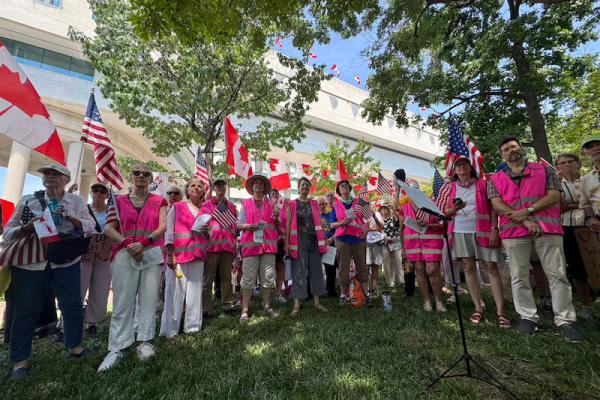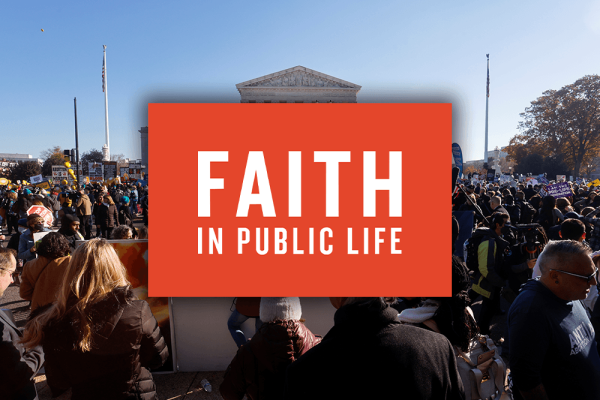Last week, I returned from vacation to find more than 2,100 National Guard troops in my city, our nation’s capital, deployed from the district and six other states at a cost estimated to be upwards of $1 million a day.
As I walked from Union Station to our nearby offices, I was filled with righteous anger—not at the National Guard troops who were milling around, simply following orders, but toward the Trump administration’s wasteful, political stunt of misusing emergency powers granted to the president with dire consequences.
Residents of the District, from all different backgrounds, are experiencing what’s happening here as an occupation with fundamentally racist and xenophobic causes and effects.
It’s not just the optics of Humvees parked outside Union Station or soldiers in desert camouflage patrolling the National Mall; an ever-present sense of menace has settled over many parts of the city, especially for many Black and brown people and others whose identities or circumstances make them vulnerable to over-policing. It’s unmarked cars directly outside bilingual childcare centers, and nannies asking to be escorted to and from their jobs. It’s also the presence of vested, armed, and often masked federal agents on our streets—all too often, we see them because they are taking a person of color into custody. It’s hearing that a former colleague couldn’t worship at their church because ICE was parked outside the sanctuary doors. It means having to go through militarized checkpoints in some of D.C.’s most popular areas for nightlife, such as U Street, and in neighborhoods with a high concentration of Latinos and immigrants, such as Columbia Heights.
President Donald Trump has repeatedly justified his actions by alleging that the city’s crime rates are out of control; this is simply not true. According to the Department of Justice, D.C. is experiencing a 30-year low in violent crime, including a 35% drop from 2023.
In a news conference this week, D.C. Mayor Muriel E. Bowser said that the increased presence of officers over the past two weeks had led to reductions in some forms of violent crime, including a dramatic decline in robberies and carjackings. But Bowser also noted that the presence of troops and masked Immigration and Customs Enforcement agents had been inefficient and led to broken trust between the community and law enforcement. She’s right: To actually make the city safer in a sustainable way, we’d need an infusion of resources for effective community policing and violence prevention—not massively cutting D.C.’s budget, as Trump has done.
Instead, residents of the District, from all different backgrounds, are experiencing what’s happening here as an occupation with fundamentally racist and xenophobic causes and effects. Many of our neighbors feel afraid to leave their homes unless it is absolutely necessary. Our unhoused neighbors are especially vulnerable to city-wide sweeps focused on removing homeless encampments without any plans in place to address the root causes of their homelessness.
And as many have observed, Trump’s actions in D.C. seem to be a preview of what he’s planning in other major cities like Chicago or Baltimore. Earlier this week, Trump signed an executive order that will create “specialized units” in the National Guard who will be “specifically trained and equipped to deal with public order issues.” Notably, Trump has threatened to bring these forces to other cities in Democratic-led states, despite the fact that cities in states led by Republicans—including Jackson, Miss., North Charleston, S.C., and Cleveland—have higher crime rates.
The power of the government is increasingly being turned into a weapon against vulnerable and marginalized neighbors. We must be crystal clear: All of this is not normal; it is an unnecessary and highly immoral misuse of power, which, if extended to other cities, will mean a further slide toward authoritarian-style governance. We cannot accept this state of affairs.
For those of us wondering what all this means as Christians, consider that we are part of a faith tradition that was birthed under the brutal occupation of the Roman Empire. The New Testament gives an account of how Jesus and early Christians made difficult and often risky decisions around compliance; active or passive resistance; acts of care; mutual aid; and embodied solidarity. They knew what it was like to experience military oppression while serving a God who proclaims radical solidarity and freedom for the oppressed and disinherited.
When some Christians interpret the gospels, they point to the fact that Jesus did not lead a political revolution that overthrew the Roman Empire or ousted the occupiers. According to this line of thinking, following Jesus only has spiritual implications—not social or political ones; the onus on us is to solely model care for our neighbors as best we can in the context of the current occupation, just as Jesus fed the five thousand or healed the sick. And of course, we should show care to our neighbors, especially those who are in the most vulnerable situations, treating them as we would treat Jesus himself.
But these interpretations forget that Jesus was falsely arrested and ultimately crucified for the political crime of sedition. Many of Jesus’ parables, the Sermon on the Mount, his prophetic witness in the temple overturning the tables of the money changers, miracles of healing, and more were ultimately viewed as enough of a threat to Roman occupation that Pontius Pilate, with the support of religious leaders, succumbed to the crowd and had Jesus crucified for posing a threat to Roman power. In our increasingly authoritarian context, we too must ask whether, in following Jesus, our witness is challenging the overreach and abuse of power by the current administration.
I often turn to the wisdom of Howard Thurman to further anchor justice work in Jesus’ life and witness. In Jesus and the Disinherited, Thurman centers Jesus’ intersectional identities as a poor Jewish man from a disparaged town in occupied Palestine—an identity that meant his back was often against the wall and that he witnessed the harms and oppression of Roman rule. To me, that means, as I wrote a few years back, that “Jesus is in direct solidarity with every marginalized and disinherited group in human history.” Today, I think that very much includes all those who are suffering and afraid under the current occupation of Washington, D.C.
As Obery Hendricks writes in The Politics of Jesus, we follow Jesus’ example when we treat people’s needs as holy, which often requires challenging and replacing dehumanizing narratives and politics. Similarly, last week my colleague Chad Stanton called us to practice “radical neighbor-love that refuses to see those unlike us as beyond our circle of concern.” Right now, it’s our job to inspire hope and a vision of the world we want to bring into being—one in which no city suffers under the yoke of a wasteful and unlawful military occupation and no child of God needs to fear injustice from the power of the government. This is what the recently departed Walter Brueggemann meant when he said we must emulate the Jesus who is “that great voice of otherwise, who saw the contradictions of the gospel to the Roman Empire and who acted out an alternative.”
Next week, shortly before the Trump administration is required by law to return control of the D.C. police to the mayor, Sojourners is working with an interfaith coalition to build that alternative by co-organizing communal tables in which faith leaders and impacted communities will share a meal, offering a counter-narrative to the unnecessary presence of the National Guard in the streets of the District of Columbia. By coming together in unity and solidarity, we hope to embody the Beloved Community during a time when armed soldiers stand on street corners and in Metro stations. This exemplifies how we must use our imagination to create the world we want to see, even amid the authoritarian tactics we are experiencing. Now is the time to stand up, speak out, provide aid to those most impacted, and work together to end what we’re seeing in D.C. and prevent it from becoming reality elsewhere.
Got something to say about what you're reading? We value your feedback!







